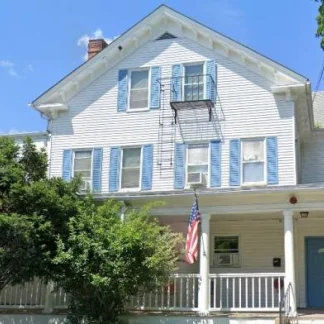Gateway Healthcare - Walk - in Access and Emergency Services
Gateway Healthcare – Walk – in Access and Emergency Services is a private rehab ...
The Jellison House is a 16-bed men’s only recovery home located in Johnston, Rhode Island. As a part of Community Care Alliance, this program serves to empower men to build better lives as they recover from substance use disorder.
The Jellison House offers residential treatment services and aftercare planning.
The residential treatment program at The Jellison House is for men only. Their program is staffed 24 hours a day, and is highly structured, with an emphasis on relapse prevention. Each week, three toxicology screenings will be administered to ensure compliance. Individual and group therapy will be conducted regularly, along with support for medical needs, employment needs, and legal needs. Additionally, the Jellison House provides a psychiatric assessment, treatment planning, and medication management that is tailored to the needs of each person. They also ensure aftercare planning is in effect prior to graduation of their program. Self-help-related education and referrals will be offered.
Aftercare programming is for individuals who have successfully gone through a treatment program but who desire or need continual support once they return home. These programs often include alumni groups, group therapy, 12 Step meetings, SMART meetings, and individual therapy. The purpose is to provide a safe space to continuously work on recovery.
Individual therapy creates the space to explore the psychological challenges associated with the addiction. With the help of a professional, individuals are given the space and direction to talk about and process their emotions. Often this includes unresolved trauma, anger, depression, anxiety, and the need for more control or autonomy in life.
Group therapy involves treatment through the process of connecting in a group setting to discuss and work through mental, emotional, and physical issues. There are a number of different group therapy modalities, including support groups, experiential therapy, psycho-education, and more. As a men-only program, Jellison House is able to provide group therapy that focuses specifically on men’s issues.
Contact us for more information: (401) 235-7121

Connect with Jellison House by calling their admissions team directly.
(401) 235-7121 Website Get DirectionsResearch clearly demonstrates that recovery is far more successful and sustainable when loved ones like family members participate in rehab and substance abuse treatment. Genetic factors may be at play when it comes to drug and alcohol addiction, as well as mental health issues. Family dynamics often play a critical role in addiction triggers, and if properly educated, family members can be a strong source of support when it comes to rehabilitation.
Group therapy is any therapeutic work that happens in a group (not one-on-one). There are a number of different group therapy modalities, including support groups, experiential therapy, psycho-education, and more. Group therapy involves treatment as well as processing interaction between group members.
In individual therapy, a patient meets one-on-one with a trained psychologist or counselor. Therapy is a pivotal part of effective substance abuse treatment, as it often covers root causes of addiction, including challenges faced by the patient in their social, family, and work/school life.
Group therapy is any therapeutic work that happens in a group (not one-on-one). There are a number of different group therapy modalities, including support groups, experiential therapy, psycho-education, and more. Group therapy involves treatment as well as processing interaction between group members.
In individual therapy, a patient meets one-on-one with a trained psychologist or counselor. Therapy is a pivotal part of effective substance abuse treatment, as it often covers root causes of addiction, including challenges faced by the patient in their social, family, and work/school life.
In individual therapy, a patient meets one-on-one with a trained psychologist or counselor. Therapy is a pivotal part of effective substance abuse treatment, as it often covers root causes of addiction, including challenges faced by the patient in their social, family, and work/school life.
Gateway Healthcare – Walk – in Access and Emergency Services is a private rehab ...
AA – Alcoholics Anonymous – 23 de Nov is a private rehab located in Providence, ...
Saint Elizabeth Court is a private rehab located in Providence, Rhode Island. Sa...
Roger Williams Medical Center – Addiction Medicine Treatment is a private rehab ...